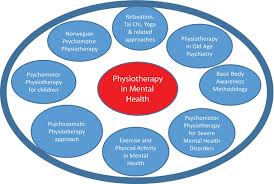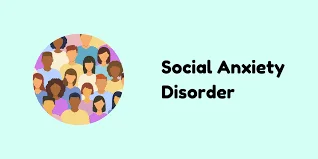What is a Social Anxiety Disorder?
Social anxiety disorder (SAD), also known as social phobia, is a prevalent and debilitating mental health condition characterized by an intense fear of social situations. Individuals with social anxiety disorder often experience overwhelming anxiety and distress in everyday social interactions, leading to avoidance behaviors that can significantly impair their daily functioning and quality of life.
- There are social circumstances where it is okay to feel anxious. For instance, giving a presentation or going on a date could make you feel butterflies in your stomach. However, everyday encounters create major worry, self-consciousness, and shame when you have a social anxiety disorder, also known as social phobia, since you dread being scrutinized or adversely judged by others.
- Fear and worry cause avoidance in social anxiety disorder, which can negatively impact your life. Extreme stress can interfere with relationships, daily activities, employment, education, and other pursuits.
- While social anxiety disorder can be a long-term mental health issue, taking medication and learning coping mechanisms in psychotherapy can boost your self-esteem and enhance your social skills.
Symptoms of Social Anxiety Disorder
Particularly in young people, shyness or uneasiness in specific settings are not always indicators of social anxiety disorder. Some people are inherently reticent, while others are more extroverted, and comfort levels in social circumstances differ depending on these personality qualities.
Unlike normal anxiety, social anxiety disorder is characterized by fear, worry, and avoidance that interfere with relationships, daily schedules, employment, education, or other pursuits. Usually starting in the early to mid-teens, social anxiety disorder can sometimes strike adults or younger children at earlier ages.
Emotional and behavioral symptoms:
Anxiety related to social situations might manifest as persistent symptoms such as:
- Being poorly judged in circumstances
- Fear making a fool of yourself or humiliating yourself
- Extreme nervousness when interacting or speaking with strangers
- Fear that people will see that you’re nervous
- Fear of embarrassing physical symptoms, such as blushing, perspiring, shaking, or trembling when speaking
- Avoidance of activities or social interactions due to embarrassment and fears
- Stay away from circumstances where you could be the center of attention
- Anxiety that arises before a feared task or occasion
- Severe anxiety or fear in social settings
- After a social scenario, an evaluation of your performance and a look for weaknesses in your interactions
- Anticipation of the worst outcomes following an unpleasant social scenario encounter
Children may weep, have temper tantrums, cling to their parents, or remain silent in social situations as a way of expressing their concern about interacting with adults or their peers. - If you have severe worry and fear when performing in public but not in other, more casual social settings, you may have a performance anxiety disorder.
Physical symptoms:
Social anxiety disorder can occasionally be accompanied by the following physical indications and symptoms:
- Blushing
- Fast heartbeat
- Trembling
- Sweating
- Upset stomach or nausea
- Trouble catching your breath
- Dizziness or lightheadedness
- Feeling that your mind has gone blank
- Muscle tension
Avoiding common social situations:
If you suffer from social anxiety disorder, it could be challenging to deal with typical, daily circumstances like:
- Interacting with unfamiliar people or strangers
- Attending parties or social gatherings
- Going to work or school
- Starting conversations
- Making eye contact
- Dating
- Going into a room where people are seated
- Returning items to a store
- Eating in front of others
- Using a public restroom
- Social anxiety disorder symptoms can change over time. Things may get worse if you’re managing a lot of demands, stress, or life changes. While avoiding stressful events could temporarily ease your symptoms, anxiety is likely to worsen over time if you don’t obtain a therapy picture of information with us, your personal information is completely protected.
When to visit a doctor:
If you avoid typical social interactions because of fear of shame, concern, or panic, see a mental health professional or your doctor.
Causes of Social Anxiety Disorder
Like many other mental health disorders, social anxiety disorder most likely stems from a complex interaction between biological and environmental factors. Among the potential reasons are:
- Inherited traits: Anxiety disorders are often inherited. It’s unclear, though, how much of this may be learned behavior and how much may be inherited.
- Brain structure: The amygdala (uh-MIG-duh-luh) is a brain structure that may be involved in regulating the fear response. Individuals with an overactive amygdala may experience elevated anxiety in social circumstances due to a heightened fear response.
- Environment: Social anxiety disorder may be a learned trait; some people may have severe anxiety in the wake of an uncomfortable or embarrassing social event. Additionally, there can be a link between social anxiety disorder and parents who exhibit nervous behavior in social settings or who overprotect or manage their kids excessively.
Risk factors:
The following are some things that can make someone more likely to acquire social anxiety disorder:
- Family history: If any of your siblings or biological parents suffer from social anxiety disorder, you are more likely to get it as well.
- Negative experiences: Youngsters who endure bullying, taunting, rejection, mockery, or embarrassment may be at higher risk of developing social anxiety disorder. In addition, this disease may be linked to other adverse life experiences like abuse, trauma, or conflict in the family.
- Temperament: Youngsters who exhibit signs of shyness, timidity, withdrawal, or restraint around strangers or unfamiliar situations may be more vulnerable.
- New social or work demands: Symptoms of social anxiety disorder usually appear in adolescence, but they can also appear for the first time when a person meets new people, gives a speech in front of an audience, or presents a significant piece of work.
- Having a noticeable appearance or health issue: For instance, tremors, stuttering, or facial deformities brought on by Parkinson’s disease might make some people feel more self-conscious and perhaps worsen their social anxiety problem.
Complications:
Social anxiety disorder can take over your life if left untreated. Anxiety can cause problems in relationships, employment, education, and general enjoyment of life. This disorder can cause:
- Low self-esteem
- Trouble being assertive
- Negative self-talk
- Hypersensitivity to criticism
- Poor social skills
- Isolation and difficult social relationships
- Social ties that are challenging and isolation
- Poor performance in school and the workplace
- substance misuse, including excessive alcohol consumption
- Suicide or attempting suicide
- Social anxiety disorder frequently coexists with other anxiety disorders and a few other mental health conditions, including major depressive disorder and substance misuse issues.
Prevention:
Although it is impossible to forecast what will lead someone to acquire an anxiety condition, if you already have anxiety, there are things you can do to lessen the severity of your symptoms:
- Get help early: Like many other mental health issues, anxiety can be more difficult to manage if you put off treatment.
- Keep a journal: You and your mental health provider can determine what’s stressing you out and what seems to make you feel better by keeping a journal of your personal life.
- Set priorities in your life: By carefully allocating your time and energy, you can lessen your tension. Make sure you engage in activities you find enjoyable.
- Avoid unhealthy substance use: Anxiety can be brought on by or made worse by the use of drugs, alcohol, caffeine, or nicotine. It might be unsettling to stop using any of these substances if you are addicted to them. See your doctor, look for a treatment program, or join a support group if you are unable to stop on your own.
Treatment of Social Anxiety Disorder
Treatment options for social anxiety disorder include medication, cognitive-behavioral therapy (CBT), and mindfulness-based interventions. These interventions have been demonstrated to be successful in reducing symptoms and enhancing social functioning in individuals with social anxiety disorder.
The prevention of long-term problems from social anxiety disorder necessitates early recognition and care.
Psychotherapy Treatment
Cognitive behavioral therapy (CBT)
Medical Treatment
Serotonin reuptake inhibitors (SSRIs)
Benzodiazepines
Beta-blockers
Physiotherapy Treatment
Anxiety disorders are dangerous mental illnesses that can have a detrimental impact on your thoughts and actions. You must handle them well.

Anxiety disorders come in several forms, including panic disorder, social anxiety disorder, adult separation anxiety disorder, generalized anxiety disorder, and specific phobia. Anxiety disorders can cause a variety of symptoms, including panic, difficulty sleeping, dry mouth, rapid heartbeat, nausea, and dizziness.
Exercise undoubtedly has a significant positive effect on your physical and emotional health. Furthermore, physical therapists can treat patients with anxiety problems since they also concentrate on helping their patients become more physically fit through various forms of exercise. Put another way, physiotherapy treatment can help someone who is experiencing anxiety regain better mental health.
Physical therapy can assist those who are experiencing anxiety in the following ways:
- Improve Your Fitness
- Reduce Stress
- Elevate Mood
- Lowers Blood Pressure

1] Recognize symptom onset:
When it comes to managing any kind of social anxiety, listening to your body and mind is your best and first line of defense. Learn to pay attention to how your body reacts to the people and surroundings around you. You must take appropriate steps to maintain your personal well-being as soon as you notice the beginning of your nervous symptoms.
Anxiety can cause physiological reactions such as blushing, perspiration, a racing heartbeat, shivering, trouble breathing or shortness of breath, lightheadedness or dizziness, dry lips, and occasionally stuttering.
I know what you’re thinking: “Everyone’s looking at me. What do they think? Do they think poorly of me? “They most likely believe I’m a loser. I have to leave since I don’t belong here or fit in. “I am at a loss for words. I have nothing to say to further the discussion. They’ll see my nervousness. I’m going to be the idiot.
Avoidance, leaving situations or events early, only going there with a friend or companion you feel comfortable with by your side, increased focus on your phone, excessive apologizing, seeking reassurance from others, and obsessive watching of other people’s reactions to you are some behavioral responses to anxiety.
2] Exercise where you are:
If you are currently feeling anxious, try to discover an exercise routine that works for you where you are. When you begin to feel nervous, it could be in class or at your office. You can practice anxiety-reducing techniques wherever you are.
Please excuse yourself and spend some alone time doing jumping jacks.
Go for a vigorous stroll up and down a few flights of stairs.
Perform activities such as push-ups, sit-ups, or balancing exercises in your personal space.
3] Go for a quick walk:
Walking can be a terrific way to relieve anxiety and get some fresh air. Go for a stroll outside or around your house, workplace, or educational facility. Doing some exercise for just ten minutes will help with passing anxiousness. Take a relaxing stroll before an important meeting at work or a public presentation to help you decompress and feel less anxious.
If the weather permits, take some time to walk outside. Being in the natural world has its benefits.
4] Do aerobic exercise:
Make time to exercise in advance of any scenario that is likely to cause you anxiety in the near future. Running, swimming, biking, and rollerblading are examples of aerobic exercises that might help lower tension and anxiety. Exercise will help you become more focused and aware, especially if stress has interfered with your ability to concentrate. A quick five minutes might be dedicated to aerobic exercise.
You can even avoid stress, worry, and depression by exercising. Regular exercisers are less prone to have anxiety or depressive symptoms.
5] Practice relaxation:
In addition to physical activity, relaxing is a key component in managing your social anxiety. Progressive muscular relaxation can help you de-stress both mentally and physically. You may manage your stress, anxiety, and moods by practicing relaxation. Every day, set aside thirty minutes to practice something calming.

Try meditation and meditation, for instance. In addition, you can read, write in a journal, or take a bath.
6] Combine exercise with therapy:
Individuals with anxiety who exercise and undergo cognitive-behavioral therapy typically experience greater improvements in their condition. Consider incorporating exercise into your treatment plan if you currently take medication or visit a therapist for your social anxiety and observe the effects.
Always go with a workout regimen that you enjoy. Above all, perseverance is key to getting the finest outcomes.
7] Set fitness goals:
Feeling confident in yourself may be difficult if you have anxiety in social situations or when performing in front of an audience. Your objectives in life, how well you do at work, and your chances of getting promoted could all be impacted by your confidence. You can develop your mental and physical abilities by exercising. You have the ability to set and achieve goals as well as get rid of unfavorable ideas that could be causing your social anxiety.
Make an effort to attempt something new or reach a fitness objective. For instance, run a mile, perform 20 push-ups, or bench press 40 pounds. Reaching your objectives will boost your self-assurance and good self-perception.
8] Exercise with others:
Try to spend as much time as possible with people in a compact space if you suffer from solitude. Take up running or joining a local gym as examples. Ask someone to be your workout partner if you find it too scary to work out in a group. Join a group at the gym or hold each other responsible for your weekly workouts. Having some accountability can help you move more if you have trouble getting motivated to work out or exercise.

Invite a close friend or relative to join you at the gym.
Make friends by using exercise classes as a means of meeting new individuals. For instance, resolve to greet a stranger or strike up a conversation after class.
9] Go outside:
Exercise outside if the thought of going to a gym seems sweaty, odorous, costly, or unpleasant. Walk or trek at your neighborhood park, do rock climbing, or go jogging there. Begin by working out alone or by joining a small group. Being outside can help you get vitamin D and be exposed to nature, both of which can improve your mood.
Walk your dog or gather your children and go for a stroll in the park.
FAQs
How can my social anxiety be reduced?
Get Used to Engaging in Social Situations
Begin with less stressful circumstances, such as socializing in a small group, and as you get more at ease, attempt new things. Select settings where you feel comfortable and supported. Go out with a friend, for instance, or choose a location that makes it simple to depart if necessary.
Is it possible to treat social anxiety?
Typically, psychotherapy (often referred to as “talk therapy”), medication, or a combination of the two are used to treat social anxiety disorder. Find out from a medical professional which course of action is best for you.
How does one experience social anxiety?
You’re always afraid of doing something you believe looks bad, like blushing, perspiring, or seeming foolish. find it challenging to complete tasks in front of people; you could constantly feel as though someone is observing and judging you. Avoid making eye contact, fear criticism, or lack confidence in oneself.
Does social anxiety not go away?
Patients with generalized SAD frequently have a lifelong, unremitting mental condition marked by extreme anxiety and incapacity once it first manifests in adolescence.
What advantages does social anxiety offer?
Unexpected Advantages of Social Anxiety
Studies have revealed that individuals suffering from social anxiety exhibit higher levels of empathy and a greater capacity to comprehend the feelings of others.
Can there be a natural solution for social anxiety?
You can conquer your fear with treatment. Commence with self-care techniques like physical activity and mindful breathing. However, if these are ineffective, discuss prescription medicine or counseling with your physician. Mental health specialists can assist you in overcoming anxiety and enhancing your social skills.

